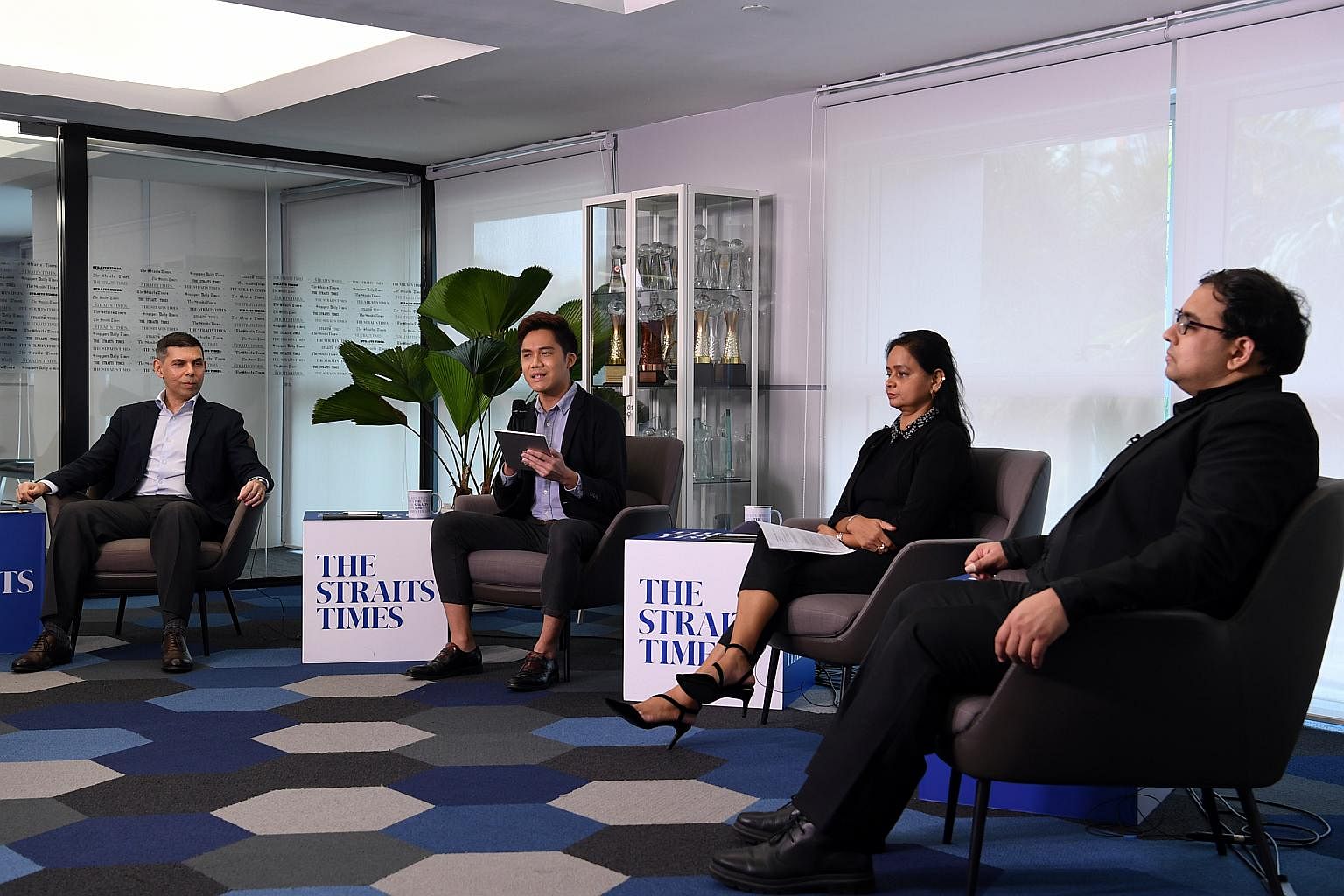More than 150 news outlets mark World News Day with journalism showcase, panel discussions
Sign up now: Get ST's newsletters delivered to your inbox

(From left) ST editor Warren Fernandez, ST correspondent Yeo Sam Jo, ST Asia News Network editor Shefali Rekhi and ST's Singapore editor Zakir Hussain speaking at a seminar during World News Day, on Sept 28, 2020.
ST PHOTO: DESMOND FOO
SINGAPORE - As the coronavirus rages, the young in Asia did not sit still.
In China, community youth leader Xie Shang Wei helped to deliver food to the elderly poor living in Harbin City.
In Indonesia, undergraduates of Bogor Agricultural University distributed masks to villagers in rural communities.
Their efforts and those of four other groups from Singapore were featured in a video screened at a webinar on Monday (Sept 28) to showcase how young adults went to the aid of victims of the virus.
It was produced by the National Youth Achievement Award Council and Singapore University of Social Sciences (SUSS).
Its screening was part of this year's World News Day celebrations, in which more than 150 media titles from across the globe signed up to mark the occasion with special reports, interviews, webinars, shows and more.
Among the reports contributed specially for World News Day this year, was a story by Indian newspaper The Hindu Business Line about local farmers at risk of losing their harvest amid a lockdown, and another by Fijian daily Fiji Sun about locals overcoming hardship in the pandemic by creating a barter trading system for goods and services.
The celebrations started at 4pm Singapore time with a webinar titled "Covid-19: How Can You Contribute?", live-streamed from the newsroom of Singapore's national broadsheet The Straits Times (ST).
In his opening remarks, Mr Warren Fernandez, ST's editor and president of the World Editors Forum (WEF), stressed the media's role in informing the masses and debunking fake news, especially during the current pandemic.
"We think the world around us is getting more and more complex, it's fast-moving and fast-changing. I think all of us could do with a little bit of help figuring things out and staying on top of developments, of separating the facts from the fiction, of helping to join the dots and sort of interpreting where we are today and where things are moving tomorrow."
This becomes absolutely critical, particularly in the current Covid-19 situation, added Mr Fernandez, who is also editor-in-chief of Singapore Press Holdings' English/Malay/Tamil media group.
He further said that newsrooms have to step up to help people make sense of what current events mean for their lives and livelihoods, and provide credible information to help them stay safe and secure.
During the webinar, two panel discussions explored how journalists are tackling the pandemic.
The first, moderated by Asian Insider editor Shefali Rekhi, focused on the ongoing "infodemic" during the pandemic, with its surge of information to deliberately spread misinformation to undermine the public health response and advance certain groups' agendas.
Both The Jakarta Post's world news editor Tama Salim and Manila Bulletin's digital content manager Pam Rances talked about their respective experiences in coping with such misinformation in their home countries, Indonesia and the Philippines.
ST's Singapore editor Zakir Hussain, also a panellist, described the challenge of grappling with various issues that popped up in society, such as whether schools should be closed and the handling of the migrant workers' dormitories, and deciding how much coverage to give each issue.
"In hindsight, maybe we could have done some things differently, but I think we tried to reflect fears, concerns and points of view fairly, all things considered," he said.
In the second panel discussion, moderated by chief of consultancy firm Strategic Moves Viswa Sadasivan, Mr Fernandez, Dr June Tay, head of the Digital Media Programme at the School of Science and Technology in SUSS, and infectious disease expert Dale Fisher, spoke on issues of credibility and trust in media organisations.
Professor Fisher, who is group chief of medicine of the National University Health System and chairman of the steering committee for Global Outbreak Alert and Response Network at the World Health Organisation, highlighted the role of effective communications in a public health crisis and the need for a responsible media.
Efforts to deliver quality coverage to readers during the Covid-19 outbreak were also highlighted in ST's specially produced video Journalism Through A Pandemic on Monday evening.
The half-hour mini documentary on ST's Facebook and YouTube pages features on-the-ground footage of its correspondents covering the scourge across Asia, showing how newsrooms have adapted to social distancing restrictions and the various ways news stories have made an impact on national policies.
The World News Day celebrations will culminate with a virtual event by the Canadian Journalism Foundation and WEF, on Tuesday (Sept 29) at 7am Singapore time, featuring Dr Anthony S. Fauci, director of the US National Institute of Allergy and Infectious Disease, and Philippine news website Rappler co-founder Maria Ressa.
The webcast will be hosted by CNN Worldwide chief media correspondent Brian Stelter, and features musical performances by singers, including Grammy award-winner Macy Gray.


